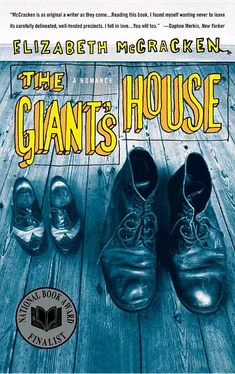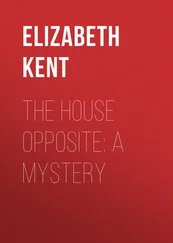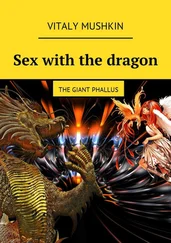Now James walked alone. James with his cane went down the street, stopped at the end. James inspected the bay from the town pier. James browsed in no stores, endured no conversation, took out not a single book from my library. He returned to the cottage, where the boys were sometimes already waiting outside.
And three weeks later he came in to see me at work, holding a cream envelope with a card inside. “I’d like to go to Stella’s wedding,” he said. “I asked; you’re invited too, if you’ll drive me.”
I smiled at the poor bargain of that invitation. But I agreed.
I had never wanted to be one of those girls in love with boys who would not have me. Unrequited love — plain desperate aboveboard boy-chasing — turned you into a salesperson, and what you were selling was something he didn’t want, couldn’t use, would never miss. Unrequited love was deciding to be useless, and I could never abide uselessness.
Neither could James. He understood. In such situations, you do one of two things — you either walk away and deny yourself, or you do sneaky things to get what you need. You attend weddings, you go for walks. You say, yes. Yes, you’re my best friend, too .
We drove up Route 6A to Wellfleet. Late June light flattens and brightens Cape Cod into a postcard. All reds seem like the same red: the flung-back shutters on the identical cottages that line the road; the lassos of neon that spell Motel ; a red-bottomed buoy that has washed up on the beach; a sign that promises lobster with a picture of a lobster. All blues the same, sky, convertibles, James’s eyes. The sand, gold where the wind has combed it; his hair, the same. The seagull in front of a cloud, the cloud, his oxford cloth shirt, all three washed just enough for a hint of gray.
And me and my big black car and what felt, increasingly, like my big black heart, as unwieldy and peculiar as my car. Maybe as hard, too: that car could have crumpled anything with its unstoppable, undentable bumper. Reserved, Caroline had said, and despite my best intentions, she was right: my torso an unorganized cabinet of secrets I was saving for a later date. They knocked into each other, they bruised and then calloused.
I’d pictured us driving along, talking, perhaps listening to the radio to music that James dialed up. Which shows you I hadn’t thought it through: in the car I couldn’t see James or his hair and eyes that matched the passing scenery. That they matched is something I know now; I might not have realized it then. He sat in the backseat and had rolled down the back window; every now and then he’d say something I couldn’t hear (my window was rolled down, too), and I’d turn my head and, at the same time, by accident, the wheel; the car would swerve. “LATER!” James would yell as I straightened the car and blushed at the cars that honked at us. We did this three times.
“I have four left wheels,” I said to James, but he couldn’t hear me.
We drove up to the church early. It took James a while to disentangle himself from the Nash. It seemed obvious to enter from the front, but how to exit was less clear.
“Here we are,” I said.
“Good Luck Cottages,” said James. “We passed those a while back.”
“I saw them. Run-down places. Probably Luck is the only good thing they can promise.”
When I’d heard the service would be in a Catholic church, I’d imagined something like Our Lady’s, which was down the street from my girlhood home. I’d snuck inside one afternoon; it was as spindly and impossible and arched as a split pepper. Even though all eyes in the paintings looked away from me — they were trained toward Jesus, or up toward God — I’d felt accused and frightened.
But St. Catherine’s was plain and white, pretty stained-glass windows set into the doors. Maybe because it was so many people’s summer church the builders thought it proper to dress it like a vacationer: sweet and only informally gaudy. When we went inside, an usher took us to the front pew, the family spot. Stella had thought this out; she knew the front was the only place James would fit. He took the aisle; I sat next to him, and eventually an unspeaking grandmother of some sort took the seat next to me.
James wore a necktie that Caroline had sewn for him; I recognized the print from one of her fall skirts. I wore a blue dress and a silly hat of feathers balanced on top of my head; Astoria had lent it to me. It was designed to cling to a hairdo without interfering, and so when I’d clipped it onto my uncoifed head that morning, my hair pinned up, more pins in the hat to affix it, the thing looked like a stuffed bird nailed to a tree branch. By now, having been knocked about by the wind through the car window, its grip was loose. I tried to fix it.
As entertainment, the wedding wasn’t much. The principals kept their backs to us. The priest mumbled and flubbed Stella’s name. I wanted some sort of dramatic ceremony, with wailing or hysterical laughter. James beside me was silent. Then the priest said something, the happy couple kissed, and it was over without bloodshed or tears.
Despite everything, I never felt jealous at weddings. I longed for love, yes, but I never saw that love was in greater supply at weddings than in butcher shops or department stores. The sight of a couple furtively holding hands beneath a restaurant table was more likely to remind me of the hopelessness of my life than any number of ladies dressed in giant christening gowns reciting words to become joined to a man in a rented suit. I do not like public ceremony, not graduations, not weddings; not pep rallies, nor church. Perhaps I simply do not understand trying to share one emotion (love, relief, faith, pep) with a quantity of strangers.
The reception was in a restaurant down the street, close enough to walk. Once there, James found a cluster of kids from school, who’d been seated in less prime spots near the back of the church and so were among the first to leave. I recognized Eric from the cottage, but the rest were an assortment of lean boys and sweet girls (girls! I hadn’t imagined that Stella knew, or would acknowledge the existence of, any girls) whom I had never met. That Stella had other friends — that she had, in fact, a life outside of the cottage — never occurred to me.
Food was served in a willy-nilly buffet. I decided I would rather be alone than be one adult among teenagers and said good-bye to James. I took a seat at a table on the other side of the room. There was no seating plan, which meant that Stella was more civilized than I’d thought: seating plans, in my opinion, are a form of social incarceration.
“What the hell is that?” a woman next to me said as the band set up by the door. She was forty, maybe, a blonde in coral lipstick that looked like a medicine meant to prevent infection. I followed her gaze, sure that it would end at a musician carrying an instrument she could not identify. Instead she was looking at James, returning from the men’s room.
I started to answer her; her date, a man in thick glasses, did instead: “Jesus Christ. How tall is that?”
They had been drinking beer in bottles, which amplified their amazement.
“That’s James Sweatt,” I told them. “He goes to school with Stella.”
“He’s a freak !” exclaimed the man, as if what I said was impossible, that the sight James presented, his jacket off and his tie loosened, could not possibly know Stella, go to school, walk the floor of the dark wood restaurant in Wellfleet.
“He’s tall,” I said casually. But the woman shook her head. Well, he shouldn’t be , she seemed to say.
By then the bandleader had stepped to the microphone to make some announcements, and Sean and Stella, the train of her wedding dress drawn up like a curtain so she could dance, took to the floor for an inane song by, according to the bandleader, “Mr. Irwin, um, Berlin, ladies and gentlemen.” (“A doll I can carry / the girl that I marry will be.…”) The people who sat next to me eventually forgot James, but I didn’t forget them: I wanted to be a movie thug who could pick them up by their shirtfronts and shake them like maracas. Even they would not know whether they were trembling from fear or physics.
Читать дальше












